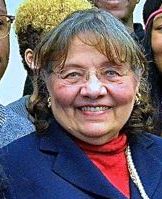
Diane Nash
Diane Judith Nash (born May 15, 1938) is an American civil rights activist, and a leader and strategist of the student wing of the Civil Rights Movement.
Diane Nash
2
Nash's campaigns were among the most successful of the era. Her efforts included the first successful civil rights campaign to integrate lunch counters (Nashville);[1] the Freedom Riders, who desegregated interstate travel;[2] co-founding the Student Nonviolent Coordinating Committee (SNCC); and co-initiating the Alabama Voting Rights Project and working on the Selma Voting Rights Movement. This helped gain Congressional passage of the Voting Rights Act of 1965, which authorized the federal government to oversee and enforce state practices to ensure that African Americans and other minorities were not prevented from registering and voting.
In July 2022, Nash was awarded the Presidential Medal of Freedom by President Joe Biden.[3]
Biography[edit]
Early life[edit]
Nash was born in 1938 and raised Catholic in a middle-class family in Chicago by her father Leon Nash and her mother Dorothy Bolton Nash. Her father was a veteran of World War II. Her mother worked as a keypunch operator during the war, leaving Nash in the care of her grandmother, Carrie Bolton, until age seven. Carrie Bolton was a cultured woman, known for her refinement and manners.[4]
After the war, Nash's parents' marriage ended. Dorothy married again to John Baker, a waiter on the railroad dining cars owned by the Pullman Company. Baker was a member of the Brotherhood of Sleeping Car Porters, one of the most powerful black unions in the nation. As Dorothy no longer worked outside the house, Diane saw less of her grandmother Carrie Bolton. Nonetheless, Bolton continued to be an important influence on Nash's life and was committed to making sure Diane understood her value.[4] Bolton didn't discuss race often, believing that racial prejudice was taught to younger generations by their elders. Her grandmother's words and actions instilled in Diane confidence and a strong sense of self-worth. Simultaneously, her grandmother's influence cultivated a sheltered environment that left her vulnerable to the severity of racism in the outside world.[5]
Education[edit]
Nash attended Catholic schools, and at one point considered becoming a nun.[1] She also was the runner-up in a regional beauty pageant leading to the competition for Miss Illinois.[1]
After graduating from Hyde Park High School in Chicago, Nash went to Washington, D.C., to attend Howard University, a historically black college (HBCU). After a year, she transferred to Fisk University in Nashville, Tennessee, where she majored in English. Nash acknowledged that she looked forward to personal growth during her time in college and wanted to explore the challenging issues of the time.[6] In Nashville, she was first exposed to the full force of Jim Crow laws and customs and their effect on the lives of Blacks. Nash recounted her experience at the Tennessee State Fair when she had to use the "Colored Women" restroom, signifying the first time she had ever seen and been impacted by segregation signage.[7] Outraged by the realities of segregation, Nash began to show signs of leadership and soon became a full-time activist.[8]
Nash's family members were shocked when she joined the Civil Rights Movement. Her grandmother was quoted as saying, "Diane, you've gotten in with the wrong bunch"; she did not know that Diane was the chairwoman of organizing the nonviolent protests at her university. Her family was not familiar with the idea of working for civil rights, and it took her family time to fully recognize her position as a key player in the Civil Rights Movement. Her mother soon become a supporter by fundraising for the Freedom Riders. Nash said in a PBS Tavis Smiley interview, "My mother ended up going to fundraisers [in Chicago that sent money to] students in the South and, [she even went] to an elevated train bus station one day at 6:00 a.m. to hand out leaflets protesting the war."[9] Her mother was influenced by Nash's sense of empowerment.[9]
Personal life[edit]
While participating in the Nashville sit-in, Nash first met fellow protester James Bevel, whom she would later marry. They had two children together, a son and a daughter. The couple divorced after seven years of marriage and Nash never remarried.